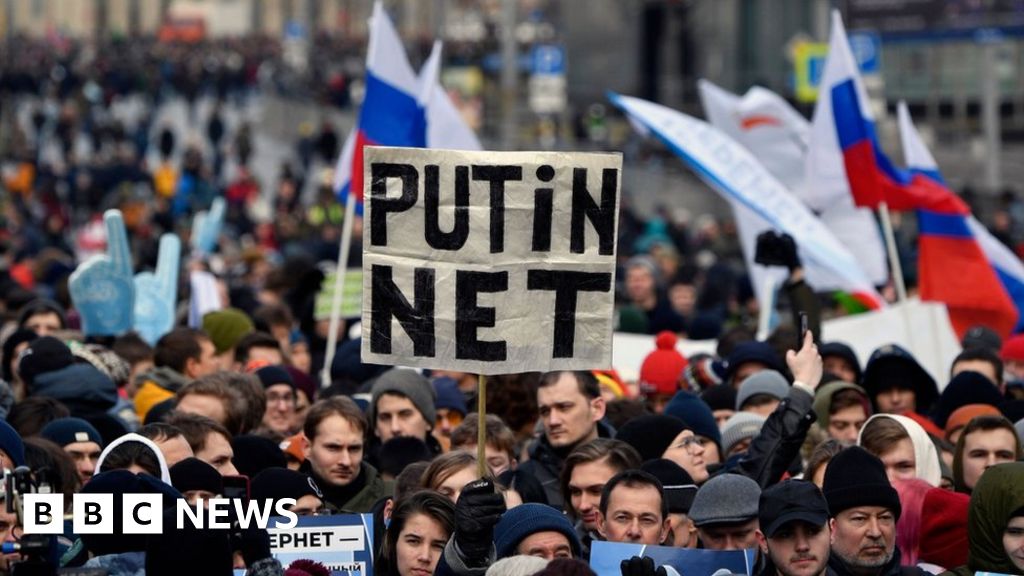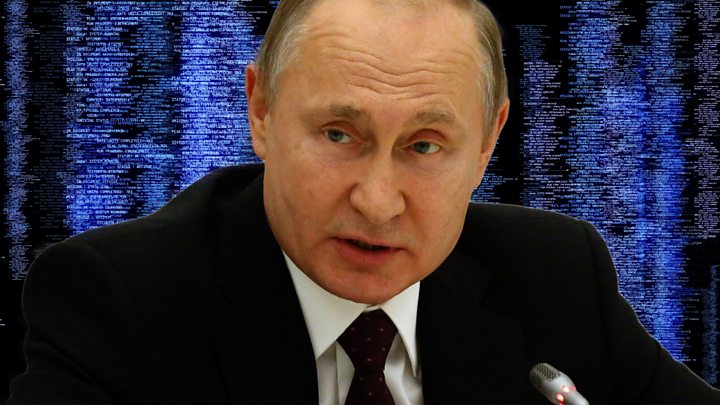Russia Internet: Law Introducing New Controls Comes Into Force

 Image copyright
Getty Images
Image copyright
Getty Images
A law introducing new controls on the internet has come into force in Russia amid concerns it may be used by the government to silence its critics.
In theory, the "sovereign internet" law gives officials wide-ranging powers to restrict traffic on the Russian web.
The Kremlin has said the law will improve cyber security. A spokesman said users would not notice any change.
Critics fear the Kremlin will try to create an internet firewall similar to that in China.
Experts say it is unclear how the powers of the controversial law might be used, or how effectively they can be implemented given the technology challenges and high costs.
What's the law about?
It gives the Kremlin the possibility to switch off connections within Russia or completely to the worldwide web "in an emergency". It is up to the government to decide what constitutes a threat and what actions should be taken.
The law requires internet service providers to install network equipment - known as deep packet inspection (DPI) - capable of identifying the source of traffic and filter content. In practice, this will allow the country's telecommunications watchdog Roskomnadzor to be more effective at blocking sites.
Russia is seeking to route the country's web traffic and data through state-controlled points, reducing reliance on foreign servers over which it has less control. Supporters say this is to protect the system from attacks from abroad.
To help with this project, the country is working on developing its own net address books so it can operate almost autonomously, although this work will not take effect until 2021.

Media playback is unsupported on your device
US intelligence has said Russia used the internet to interfere in the US 2016 presidential election, an allegation Moscow denies.
This is the latest in a swathe of tougher internet laws approved by Russia. Earlier this year, parliament passed two bills outlawing "disrespect" of authorities and the spread of what the government deemed to be "fake news".
Is it what they say it is?
All the official talk is about how this law will ensure Russia keeps functioning if the West "attacks" and cuts the country off from the internet. That is why it is dubbed the "sovereign internet" bill: to underline how Russia can survive in isolation - even thrive, as it claims it has under Western sanctions.
All the chatter, though, is that the law actually aims to increase control over the internet here inside Russia. The DPI technology being tested allows the state regulator to filter traffic and block what it wants. The criteria for such censorship is usefully vague.
The hugely popular messaging app Telegram will likely be an early target. The regulator's last attempt to block it using IP addresses was a flop as hundreds of other sites and service were knocked off line instead.
If the filtering technology is installed nation-wide, IT experts are sure all users will feel it. One compared the attempt to squeeze all internet traffic through the DPI "black boxes" to the crush of passengers trying to get on the Moscow metro at rush hour.
Why are there concerns?
Campaigners say the law, which was signed by President Vladimir Putin earlier this year, is an attempt to increase censorship, building on the internet legislation that already curtails freedom of expression and privacy.
"Now the government can directly censor content or even turn Russia's internet into a closed system without telling the public what they are doing or why," said Rachel Denber, Human Rights Watch's deputy Europe and Central Asia director.
The law, observers say, allows the government to block content without judicial consent and leaves users unaware about what information is being blocked and why.
Christian Mihr, from the group Reporters Without Borders, said: "[The law] proves that the Russian leadership is ready to bring the entire network infrastructure under political control in order to cut off the digital information flow whenever needed."
But Kremlin spokesman Dmitry Peskov said the government had no plans to isolate internet users: "No-one is suggesting cutting the internet."
In March, thousands of people protested in Moscow against the law.
From Chip War To Cloud War: The Next Frontier In Global Tech Competition
The global chip war, characterized by intense competition among nations and corporations for supremacy in semiconductor ... Read more
The High Stakes Of Tech Regulation: Security Risks And Market Dynamics
The influence of tech giants in the global economy continues to grow, raising crucial questions about how to balance sec... Read more
The Tyranny Of Instagram Interiors: Why It's Time To Break Free From Algorithm-Driven Aesthetics
Instagram has become a dominant force in shaping interior design trends, offering a seemingly endless stream of inspirat... Read more
The Data Crunch In AI: Strategies For Sustainability
Exploring solutions to the imminent exhaustion of internet data for AI training.As the artificial intelligence (AI) indu... Read more
Google Abandons Four-Year Effort To Remove Cookies From Chrome Browser
After four years of dedicated effort, Google has decided to abandon its plan to remove third-party cookies from its Chro... Read more
LinkedIn Embraces AI And Gamification To Drive User Engagement And Revenue
In an effort to tackle slowing revenue growth and enhance user engagement, LinkedIn is turning to artificial intelligenc... Read more

